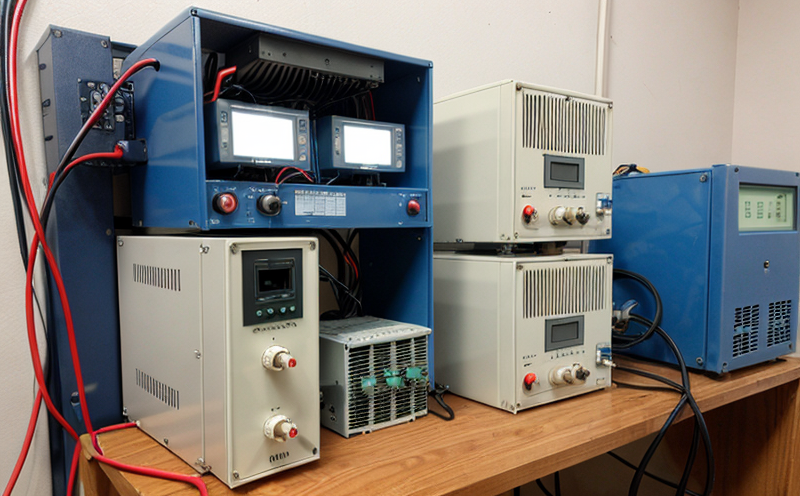IEC 60404 Magnetic Testing of Railway Electrical Components
The International Electrotechnical Commission (IEC) Standard IEC 60404 is a comprehensive set of guidelines specifically designed for the magnetic testing of electrical and electronic components used in railway systems. This service focuses on ensuring that these components are capable of withstanding the harsh environments they operate within, while also meeting stringent quality control measures.
IEC 60404 encompasses various tests aimed at identifying potential weaknesses or defects in materials and processes through magnetic particle inspection (MPI) methods. These inspections help detect flaws such as cracks, porosity, and other surface imperfections that could compromise the integrity of railway electrical components. The standard is crucial for ensuring reliability and safety, which are paramount in the transportation sector.
The testing process involves several steps, including specimen preparation, application of magnetic flux, detection of defects, and evaluation based on strict acceptance criteria outlined by IEC 60404. Specimen preparation typically includes cleaning, degaussing, and ensuring that components are free from any external interference that could affect the accuracy of the test.
The use of MPI in railway electrical component testing is particularly important because it allows for non-destructive evaluation (NDE), meaning that no harm comes to the component during inspection. This method leverages the principle of ferromagnetism, where magnetic fields are induced into the component, and any discontinuities in the material cause localized distortions in these fields. These distortions can then be visualized using appropriate equipment.
The acceptance criteria for IEC 60404 testing are stringent to ensure that only components meeting specified standards are approved for use in railway systems. Compliance with this standard is essential for maintaining high-quality products and adhering to international safety regulations.
IEC 60404 magnetic testing plays a critical role in safeguarding the integrity of railway electrical components, thereby enhancing overall system reliability and safety. By adhering to these standards, manufacturers can ensure their products meet global quality benchmarks, which is increasingly important as the rail industry expands internationally.
Industry Applications
| Component Type | Applications |
|---|---|
| Motors and Generators | Ensuring reliable power generation and distribution in railway locomotives. |
| Transformers | Checking for core laminations and insulation integrity to prevent short circuits. |
| Circuit Breakers | Verifying the integrity of contacts and arc chutes under extreme conditions. |
| Fuses | Evaluating the performance of fuse elements in high-voltage applications. |
The IEC 60404 magnetic testing service is widely utilized across various railway subsystems, including traction systems, signaling equipment, and maintenance tools. These tests are integral to maintaining compliance with international standards and ensuring the reliability of components in harsh operational environments.
By leveraging this service, manufacturers can ensure their products meet stringent quality control measures and adhere to global safety regulations. This is particularly important as the rail industry continues to grow both domestically and internationally. The testing process not only enhances product durability but also contributes significantly to overall system reliability and safety.
Why Choose This Test
Selecting IEC 60404 magnetic testing for railway electrical components offers numerous advantages, particularly in terms of ensuring quality control and compliance with international standards. By choosing this test, manufacturers can guarantee that their products meet the highest safety and reliability benchmarks.
- Comprehensive Evaluation: This service provides a thorough examination of components using MPI methods to identify potential defects and weaknesses.
- Non-Destructive Inspection: The testing process is non-destructive, meaning it does not alter or damage the component being inspected.
- Stringent Acceptance Criteria: Compliance with IEC 60404 ensures that only components meeting strict standards are approved for use in railway systems.
- Global Recognition: Adherence to this standard is recognized worldwide, ensuring that products meet international quality and safety regulations.
The rigorous nature of the testing process, coupled with its focus on non-destructive evaluation, makes IEC 60404 magnetic testing an essential service for manufacturers in the railway industry. It not only enhances product durability but also contributes significantly to overall system reliability and safety, which are critical factors in ensuring the smooth operation of rail transport systems.
Environmental and Sustainability Contributions
- Reduction in Waste: By identifying defects early in the manufacturing process, this service helps minimize waste and reduce production costs.
- Energy Efficiency: Ensuring that components are reliable and perform optimally can lead to increased energy efficiency within railway systems.
- Resource Conservation: The non-destructive nature of the test allows for reevaluation and potential reuse of components, contributing to resource conservation.
- Longevity of Systems: Reliable components contribute to the longevity of railway systems, reducing the need for frequent maintenance and replacements.
The IEC 60404 magnetic testing service plays a crucial role in promoting sustainability within the railway industry. By ensuring that only high-quality, reliable products are used, this service helps reduce environmental impact while enhancing overall system efficiency and longevity.





